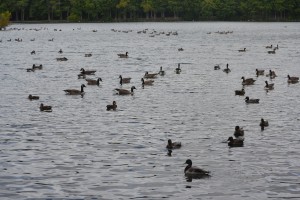
BERLIN – While it’s too early to say if the efforts are working, the Ocean Pines Association has taken a multi-faceted approach to reducing the number of geese taking up residence in the community.
While the area is full of Canada geese in the midst of their annual fall migration, the Ocean Pines Association (OPA) has spent much of the past year targeting the non-migratory Canada geese that have settled around the ponds in the community. Following concerns about the effect the birds would have on water quality put forth by the Environmental and Natural Asset Advisory Committee, association officials last fall decided on a three-tiered system to discourage geese from settling in the area.
“The board decided on a multi-pronged approach to effectively manage the goose population,” OPA General Manager Bob Thompson said.
The first action officials took was to create a no-mow area at the water’s edge at the ponds at the north and south gates to the community. The high grass now lining the ponds, though it looks unkempt to some, is meant to serve as a deterrent to geese.
“The geese are uncertain if there are predators in the foliage,” Thompson explained. “They’re less comfortable there.”
Another method used to discourage geese from moving into the Pines was the application of a chemical agent to the grass in some areas.
“When they eat the grass it upsets their stomach and it’s no longer appetizing,” he said.
Members of the Environmental and Natural Asset Advisory Committee also worked on “addling” goose eggs in the area of the Ocean Pines ponds. Committee members coat the eggs in oil, which keeps them from hatching, and return them to the nest. With no goslings to raise, geese have less reason to remain in the area.
“The message to mother goose is this is not a good spot to have her eggs,” Thompson said.
Though members of the advisory committee declined to comment for this story, Thompson said they were expected to evaluate the success of this year’s approach to the goose problem and would update the association’s board of directors during their annual report.

